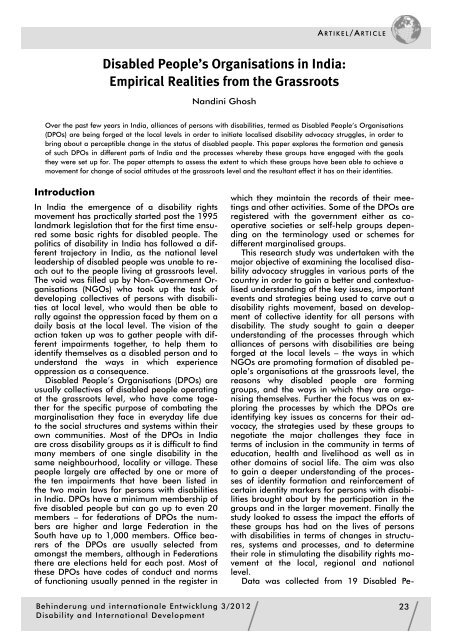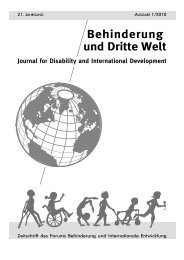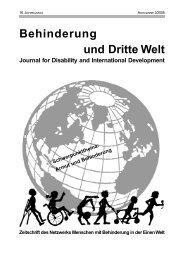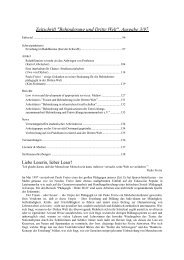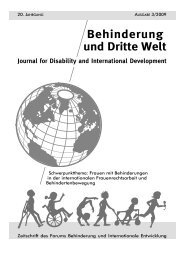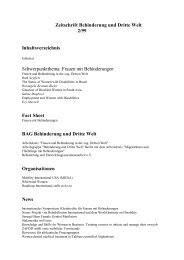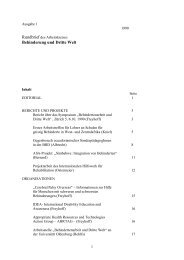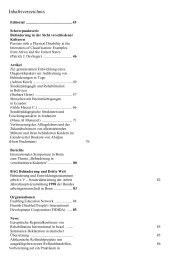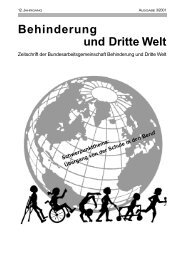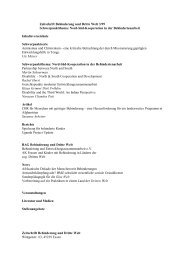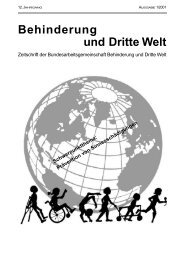Behinderung und internationale Entwicklung Disability and ...
Behinderung und internationale Entwicklung Disability and ...
Behinderung und internationale Entwicklung Disability and ...
You also want an ePaper? Increase the reach of your titles
YUMPU automatically turns print PDFs into web optimized ePapers that Google loves.
A RTIKEL/ARTICLEDisabled People’s Organisations in India:Empirical Realities from the GrassrootsN<strong>and</strong>ini GhoshOver the past few years in India, alliances of persons with disabilities, termed as Disabled People’s Organisations(DPOs) are being forged at the local levels in order to initiate localised disability advocacy struggles, in order tobring about a perceptible change in the status of disabled people. This paper explores the formation <strong>and</strong> genesisof such DPOs in different parts of India <strong>and</strong> the processes whereby these groups have engaged with the goalsthey were set up for. The paper attempts to assess the extent to which these groups have been able to achieve amovement for change of social attitudes at the grassroots level <strong>and</strong> the resultant effect it has on their identities.IntroductionIn India the emergence of a disability rightsmovement has practically started post the 1995l<strong>and</strong>mark legislation that for the first time ensuredsome basic rights for disabled people. Thepolitics of disability in India has followed a differenttrajectory in India, as the national levelleadership of disabled people was unable to reachout to the people living at grassroots level.The void was filled up by Non-Government Organisations(NGOs) who took up the task ofdeveloping collectives of persons with disabilitiesat local level, who would then be able torally against the oppression faced by them on adaily basis at the local level. The vision of theaction taken up was to gather people with differentimpairments together, to help them toidentify themselves as a disabled person <strong>and</strong> to<strong>und</strong>erst<strong>and</strong> the ways in which experienceoppression as a consequence.Disabled People’s Organisations (DPOs) areusually collectives of disabled people operatingat the grassroots level, who have come togetherfor the specific purpose of combating themarginalisation they face in everyday life dueto the social structures <strong>and</strong> systems within theirown communities. Most of the DPOs in Indiaare cross disability groups as it is difficult to findmany members of one single disability in thesame neighbourhood, locality or village. Thesepeople largely are affected by one or more ofthe ten impairments that have been listed inthe two main laws for persons with disabilitiesin India. DPOs have a minimum membership offive disabled people but can go up to even 20members – for federations of DPOs the numbersare higher <strong>and</strong> large Federation in theSouth have up to 1,000 members. Office bearersof the DPOs are usually selected fromamongst the members, although in Federationsthere are elections held for each post. Most ofthese DPOs have codes of conduct <strong>and</strong> normsof functioning usually penned in the register inwhich they maintain the records of their meetings<strong>and</strong> other activities. Some of the DPOs areregistered with the government either as cooperativesocieties or self-help groups dependingon the terminology used or schemes fordifferent marginalised groups.This research study was <strong>und</strong>ertaken with themajor objective of examining the localised disabilityadvocacy struggles in various parts of thecountry in order to gain a better <strong>and</strong> contextualised<strong>und</strong>erst<strong>and</strong>ing of the key issues, importantevents <strong>and</strong> strategies being used to carve out adisability rights movement, based on developmentof collective identity for all persons withdisability. The study sought to gain a deeper<strong>und</strong>erst<strong>and</strong>ing of the processes through whichalliances of persons with disabilities are beingforged at the local levels – the ways in whichNGOs are promoting formation of disabled people’sorganisations at the grassroots level, thereasons why disabled people are forminggroups, <strong>and</strong> the ways in which they are organisingthemselves. Further the focus was on exploringthe processes by which the DPOs areidentifying key issues as concerns for their advocacy,the strategies used by these groups tonegotiate the major challenges they face interms of inclusion in the community in terms ofeducation, health <strong>and</strong> livelihood as well as inother domains of social life. The aim was alsoto gain a deeper <strong>und</strong>erst<strong>and</strong>ing of the processesof identity formation <strong>and</strong> reinforcement ofcertain identity markers for persons with disabilitiesbrought about by the participation in thegroups <strong>and</strong> in the larger movement. Finally thestudy looked to assess the impact the efforts ofthese groups has had on the lives of personswith disabilities in terms of changes in structures,systems <strong>and</strong> processes, <strong>and</strong> to determinetheir role in stimulating the disability rights movementat the local, regional <strong>and</strong> nationallevel.Data was collected from 19 Disabled Pe-<strong>Behinderung</strong> <strong>und</strong> <strong>internationale</strong> <strong>Entwicklung</strong> 3/2012<strong>Disability</strong> <strong>and</strong> International Development23


